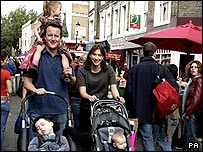The break-up of co-habiting couples leads to severe social problems, a Conservative report has warned. Half of co-habiting parents split by their child's fifth birthday, while only one in 12 married couples did, the social justice group report says.
This is manifested in appalling rates of family breakdown, educational failure, welfare dependency, drug and alcohol addiction and indebtedness.
Perhaps, unsurprisingly, these five "pathways to poverty" reinforce and entrench each other.
 "Breakdown Britain", the interim report of the Conservative Party's Social Justice Policy Group, shows that in spite of all the government's spending, relative poverty is getting worse, not better. Iain Duncan Smith's group, which is shaping Tory policy on poverty, publishes its interim report next week.
"Breakdown Britain", the interim report of the Conservative Party's Social Justice Policy Group, shows that in spite of all the government's spending, relative poverty is getting worse, not better. Iain Duncan Smith's group, which is shaping Tory policy on poverty, publishes its interim report next week. Labour trumpets its supposed success of taking 2 million children out of poverty, even though the government's own statistics show the true figure is a more modest 700,000.
It is true that vast sums have been spent through tax credits in moving people who are just below the poverty line (60% of median income), to just above it. Many of the families receiving tax credits that take them over the poverty line are still in desperate circumstances. Over 1 million children live in homes where someone is an alcoholic. What chance do the 350,000 or more children whose parents are addicted to hard drugs have to fulfil their potential? Children who have suffered family breakdown are 75% more likely to suffer educational failure.
Conservative leader David Cameron has said families are the "ultimate source of our society's strength or weakness".
 He said his party must "look at ways of supporting families and also supporting marriage so that couples are encouraged to get together and stay together". The UK would be better off with more marriages and fewer divorces, he added.
He said his party must "look at ways of supporting families and also supporting marriage so that couples are encouraged to get together and stay together". The UK would be better off with more marriages and fewer divorces, he added.Mr Cameron added: "Families matter because almost every social problem that we face comes down to family stability. If marriage rates went up, if divorce rates came down - if more couples stayed together for longer, would our society be better off? My answer is yes."


.jpg)